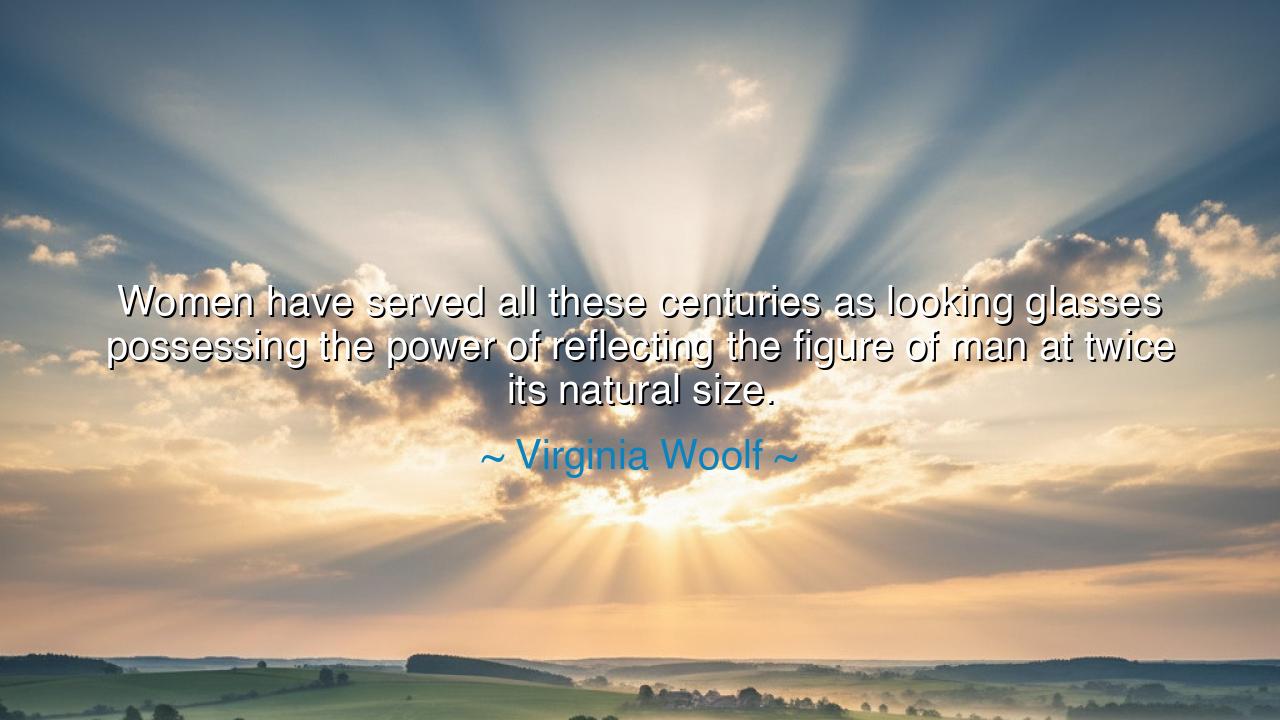
Women have served all these centuries as looking glasses
Women have served all these centuries as looking glasses possessing the power of reflecting the figure of man at twice its natural size.






The words of Virginia Woolf strike like lightning upon the old order: “Women have served all these centuries as looking glasses, possessing the power of reflecting the figure of man at twice its natural size.” In this sharp vision, she reveals the hidden labor imposed upon women—not the shaping of nations through voice or deed, but the magnifying of men’s pride, their courage doubled in the mirror of female adoration. Women were trained to be the silent glass, making men appear stronger, wiser, more heroic than they truly were.
This was no natural role, but one carved by centuries of culture. Men, to maintain their dominion, required not only laws and power but also a constant echo of greatness. That echo was found in women, whose worth was narrowed to the service of reflection. The more they diminished themselves, the brighter men appeared. Thus Woolf unmasks the lie: that women’s silence was not weakness but a design, a structure built to magnify others while their own gifts lay unused.
Consider the salons of Europe, where brilliant women—Émilie du Châtelet in France, or Mary Wollstonecraft in England—struggled against this fate. They were told that their highest calling was to flatter, to inspire, to enlarge the figure of the men beside them. Yet when they claimed their own intellect, they shattered the mirror and demanded to be seen as more than reflections. Their courage echoes Woolf’s truth: women have always been capable of light, but society forced them to shine it outward, never inward.
The image of the looking glass is thus both tragedy and warning. For a people who trains half its number only to magnify the other half, squanders untold genius. The poets, the scientists, the leaders who might have risen were instead reduced to silence, their fire dimmed so that another’s might blaze. It is a theft more subtle than chains, for it was gilded in praise, yet it robbed as surely as iron.
O children of the future, let this teaching endure: break the mirrors that distort. Let women no longer serve as mere reflectors, but as sources of light in their own right. For only when every mind is nourished, every voice heard, and every soul free to rise, will humanity see itself not in distortion, but in truth. The age of magnifying others at the cost of self must pass, lest we remain blind to half the wisdom of the world.






AA
The image of women as ‘looking glasses’ is quite thought-provoking, but it also feels somewhat limiting. Woolf paints a picture of women as passive, echoing the image of men in exaggerated proportions. How does this idea of women’s role compare to today’s progress toward gender equality? Is the struggle to break free from traditional roles still as relevant now as it was in Woolf’s time?
THSuy Tu Hac
Woolf’s statement speaks to the historical role of women as a kind of backdrop to men’s ambitions, a mirror reflecting their grandeur. But can we look at this from another angle? Might women, in their reflection, also shape and influence the man they mirror? Does this power of reflection give women a certain influence, even in a limited role?
NHPham Thi Ngoc Huyen
This quote seems to suggest that women have been reduced to mirrors, reflecting men's idealized selves. Is Woolf suggesting that society has never truly seen women for who they are? And if so, how do we move beyond this role of mere reflection? Shouldn't women be allowed to define their own identity rather than be seen through the lens of male expectations?
TNtran thi thanh ngan
Virginia Woolf’s metaphor of women as looking glasses is both profound and troubling. It suggests that women have been relegated to a role where their identity is shaped solely by the reflection of men. But does this accurately capture the role women play in society, or is it more of a critique of how society views women? Can we escape this one-dimensional portrayal of women as mere reflections?